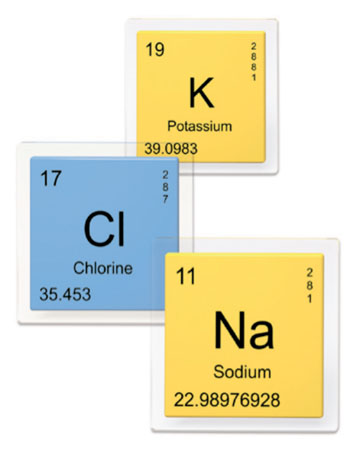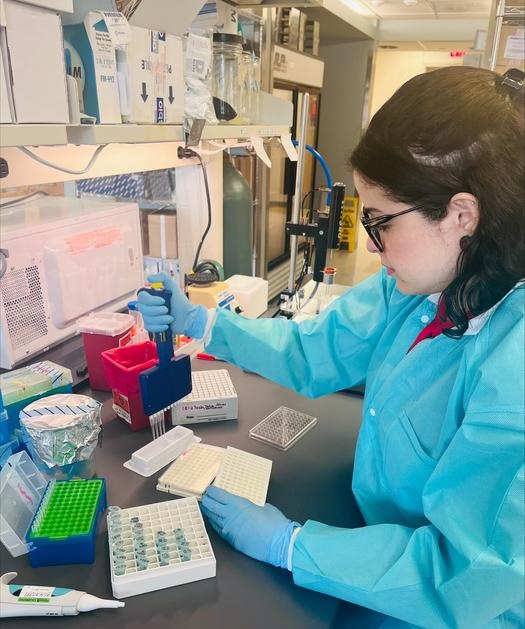Photometric Tests for Common Electrolytes Provide High-Precision Alternative
|
By LabMedica International staff writers Posted on 19 Mar 2014 |

Image: Photometric clinical tests for potassium, chloride, and sodium developed by DiaSys provide a reliable, cost-saving alternative or compliment to ISE-based measurement (Photo courtesy of DiaSys Diagnostics).
As a high quality, reliable alternative or compliment to ion-selective electrode (ISE)-based diagnosis, new photometric tests for sodium, potassium, and chloride provide accurate and precise results over a wide linear range, and are applicable to almost any clinical chemistry analyzer.
Liquid-stable, ready-to-use reagents for photometric determination of sodium, potassium, and chloride are now available from DiaSys Diagnostic Systems (Holzheim, Germany). The drawback of the ISE-based method is the high price for labs with a small to mid-size amount of measurement requests. Time-consuming rinsing and renewal of expensive electrodes regardless of number of tests performed, result in high regular maintenance costs. Using its leading technology in fluid-stable reagents, DiaSys has developed these high-precision photometric electrolyte tests as the laborsaving and economic alternative. In addition, no separate dedicated workstation is required.
Additional advantages of the tests include: minimized interferences, traceable to international reference material, excellent on-board and calibration stability, long shelf-life of reagents, reduced workload for lab staff, no sample splitting needed, one report per patient, improved traceability of patient results, reduced risk of data transfer errors. Measuring ranges are: Sodium FS [Fluid Stable] = 100–180 mmol/L, Potassium FS = 2–8 mmol/L, Chloride 21 FS = 40–170 mmol/L
The innovative testing system also includes a one-for-all multielectrolyte calibrator, TruCal E, a liquid-stable, ready-to-use (no dilution steps) calibrator for sodium, potassium, chloride, that contains serum to react more like patient samples. The photometric tests can also be used as a simple backup for ISE-based analysis.
Processes and resources are certified according to ISO 13485, ISO 9001, and fulfill highest internal quality standards. Sustainable processes and products preserve the environment. The chloride test uses an innovative methodology avoiding toxic and harming mercury compounds used in established reagents. Premium after-sales service is also provided.
Related Links:
DiaSys Diagnostic Systems
Liquid-stable, ready-to-use reagents for photometric determination of sodium, potassium, and chloride are now available from DiaSys Diagnostic Systems (Holzheim, Germany). The drawback of the ISE-based method is the high price for labs with a small to mid-size amount of measurement requests. Time-consuming rinsing and renewal of expensive electrodes regardless of number of tests performed, result in high regular maintenance costs. Using its leading technology in fluid-stable reagents, DiaSys has developed these high-precision photometric electrolyte tests as the laborsaving and economic alternative. In addition, no separate dedicated workstation is required.
Additional advantages of the tests include: minimized interferences, traceable to international reference material, excellent on-board and calibration stability, long shelf-life of reagents, reduced workload for lab staff, no sample splitting needed, one report per patient, improved traceability of patient results, reduced risk of data transfer errors. Measuring ranges are: Sodium FS [Fluid Stable] = 100–180 mmol/L, Potassium FS = 2–8 mmol/L, Chloride 21 FS = 40–170 mmol/L
The innovative testing system also includes a one-for-all multielectrolyte calibrator, TruCal E, a liquid-stable, ready-to-use (no dilution steps) calibrator for sodium, potassium, chloride, that contains serum to react more like patient samples. The photometric tests can also be used as a simple backup for ISE-based analysis.
Processes and resources are certified according to ISO 13485, ISO 9001, and fulfill highest internal quality standards. Sustainable processes and products preserve the environment. The chloride test uses an innovative methodology avoiding toxic and harming mercury compounds used in established reagents. Premium after-sales service is also provided.
Related Links:
DiaSys Diagnostic Systems
Latest Technology News
- New Diagnostic System Achieves PCR Testing Accuracy
- DNA Biosensor Enables Early Diagnosis of Cervical Cancer
- Self-Heating Microfluidic Devices Can Detect Diseases in Tiny Blood or Fluid Samples
- Breakthrough in Diagnostic Technology Could Make On-The-Spot Testing Widely Accessible
- First of Its Kind Technology Detects Glucose in Human Saliva
- Electrochemical Device Identifies People at Higher Risk for Osteoporosis Using Single Blood Drop
- Novel Noninvasive Test Detects Malaria Infection without Blood Sample
- Portable Optofluidic Sensing Devices Could Simultaneously Perform Variety of Medical Tests
- Point-of-Care Software Solution Helps Manage Disparate POCT Scenarios across Patient Testing Locations
- Electronic Biosensor Detects Biomarkers in Whole Blood Samples without Addition of Reagents
- Breakthrough Test Detects Biological Markers Related to Wider Variety of Cancers
- Rapid POC Sensing Kit to Determine Gut Health from Blood Serum and Stool Samples
- Device Converts Smartphone into Fluorescence Microscope for Just USD 50
- Wi-Fi Enabled Handheld Tube Reader Designed for Easy Portability
Channels
Molecular Diagnostics
view channelUltrasound-Aided Blood Testing Detects Cancer Biomarkers from Cells
Ultrasound imaging serves as a noninvasive method to locate and monitor cancerous tumors effectively. However, crucial details about the cancer, such as the specific types of cells and genetic mutations... Read more_1.jpg)
New DNA Origami Technique to Advance Disease Diagnosis
DNA origami is a method used to create nanostructures with exceptional precision, utilizing DNA strands as the foundational building blocks. These structures, however, are inherently fragile and prone... Read more.jpg)
New Respiratory Syndromic Testing Panel Provides Fast and Accurate Results
Respiratory tract infections are a major reason for emergency department visits and hospitalizations. According to the CDC, the U.S. sees up to 41 million influenza cases annually, resulting in several... Read more
New Synthetic Biomarker Technology Differentiates Between Prior Zika and Dengue Infections
Until now, researchers and clinicians have lacked diagnostic tools to easily differentiate between past infections with different flaviviruses—a family of mostly mosquito- and tick-borne viruses that include... Read moreHematology
view channel
Next Generation Instrument Screens for Hemoglobin Disorders in Newborns
Hemoglobinopathies, the most widespread inherited conditions globally, affect about 7% of the population as carriers, with 2.7% of newborns being born with these conditions. The spectrum of clinical manifestations... Read more
First 4-in-1 Nucleic Acid Test for Arbovirus Screening to Reduce Risk of Transfusion-Transmitted Infections
Arboviruses represent an emerging global health threat, exacerbated by climate change and increased international travel that is facilitating their spread across new regions. Chikungunya, dengue, West... Read more
POC Finger-Prick Blood Test Determines Risk of Neutropenic Sepsis in Patients Undergoing Chemotherapy
Neutropenia, a decrease in neutrophils (a type of white blood cell crucial for fighting infections), is a frequent side effect of certain cancer treatments. This condition elevates the risk of infections,... Read more
First Affordable and Rapid Test for Beta Thalassemia Demonstrates 99% Diagnostic Accuracy
Hemoglobin disorders rank as some of the most prevalent monogenic diseases globally. Among various hemoglobin disorders, beta thalassemia, a hereditary blood disorder, affects about 1.5% of the world's... Read moreImmunology
view channel
Diagnostic Blood Test for Cellular Rejection after Organ Transplant Could Replace Surgical Biopsies
Transplanted organs constantly face the risk of being rejected by the recipient's immune system which differentiates self from non-self using T cells and B cells. T cells are commonly associated with acute... Read more
AI Tool Precisely Matches Cancer Drugs to Patients Using Information from Each Tumor Cell
Current strategies for matching cancer patients with specific treatments often depend on bulk sequencing of tumor DNA and RNA, which provides an average profile from all cells within a tumor sample.... Read more
Genetic Testing Combined With Personalized Drug Screening On Tumor Samples to Revolutionize Cancer Treatment
Cancer treatment typically adheres to a standard of care—established, statistically validated regimens that are effective for the majority of patients. However, the disease’s inherent variability means... Read moreMicrobiology
view channel
Integrated Solution Ushers New Era of Automated Tuberculosis Testing
Tuberculosis (TB) is responsible for 1.3 million deaths every year, positioning it as one of the top killers globally due to a single infectious agent. In 2022, around 10.6 million people were diagnosed... Read more
Automated Sepsis Test System Enables Rapid Diagnosis for Patients with Severe Bloodstream Infections
Sepsis affects up to 50 million people globally each year, with bacteraemia, formerly known as blood poisoning, being a major cause. In the United States alone, approximately two million individuals are... Read moreEnhanced Rapid Syndromic Molecular Diagnostic Solution Detects Broad Range of Infectious Diseases
GenMark Diagnostics (Carlsbad, CA, USA), a member of the Roche Group (Basel, Switzerland), has rebranded its ePlex® system as the cobas eplex system. This rebranding under the globally renowned cobas name... Read more
Clinical Decision Support Software a Game-Changer in Antimicrobial Resistance Battle
Antimicrobial resistance (AMR) is a serious global public health concern that claims millions of lives every year. It primarily results from the inappropriate and excessive use of antibiotics, which reduces... Read morePathology
view channelHyperspectral Dark-Field Microscopy Enables Rapid and Accurate Identification of Cancerous Tissues
Breast cancer remains a major cause of cancer-related mortality among women. Breast-conserving surgery (BCS), also known as lumpectomy, is the removal of the cancerous lump and a small margin of surrounding tissue.... Read more
AI Advancements Enable Leap into 3D Pathology
Human tissue is complex, intricate, and naturally three-dimensional. However, the thin two-dimensional tissue slices commonly used by pathologists to diagnose diseases provide only a limited view of the... Read more
New Blood Test Device Modeled on Leeches to Help Diagnose Malaria
Many individuals have a fear of needles, making the experience of having blood drawn from their arm particularly distressing. An alternative method involves taking blood from the fingertip or earlobe,... Read more
Robotic Blood Drawing Device to Revolutionize Sample Collection for Diagnostic Testing
Blood drawing is performed billions of times each year worldwide, playing a critical role in diagnostic procedures. Despite its importance, clinical laboratories are dealing with significant staff shortages,... Read moreTechnology
view channel
New Diagnostic System Achieves PCR Testing Accuracy
While PCR tests are the gold standard of accuracy for virology testing, they come with limitations such as complexity, the need for skilled lab operators, and longer result times. They also require complex... Read more
DNA Biosensor Enables Early Diagnosis of Cervical Cancer
Molybdenum disulfide (MoS2), recognized for its potential to form two-dimensional nanosheets like graphene, is a material that's increasingly catching the eye of the scientific community.... Read more
Self-Heating Microfluidic Devices Can Detect Diseases in Tiny Blood or Fluid Samples
Microfluidics, which are miniature devices that control the flow of liquids and facilitate chemical reactions, play a key role in disease detection from small samples of blood or other fluids.... Read more
Breakthrough in Diagnostic Technology Could Make On-The-Spot Testing Widely Accessible
Home testing gained significant importance during the COVID-19 pandemic, yet the availability of rapid tests is limited, and most of them can only drive one liquid across the strip, leading to continued... Read moreIndustry
view channel
Danaher and Johns Hopkins University Collaborate to Improve Neurological Diagnosis
Unlike severe traumatic brain injury (TBI), mild TBI often does not show clear correlations with abnormalities detected through head computed tomography (CT) scans. Consequently, there is a pressing need... Read more
Beckman Coulter and MeMed Expand Host Immune Response Diagnostics Partnership
Beckman Coulter Diagnostics (Brea, CA, USA) and MeMed BV (Haifa, Israel) have expanded their host immune response diagnostics partnership. Beckman Coulter is now an authorized distributor of the MeMed... Read more_1.jpg)












